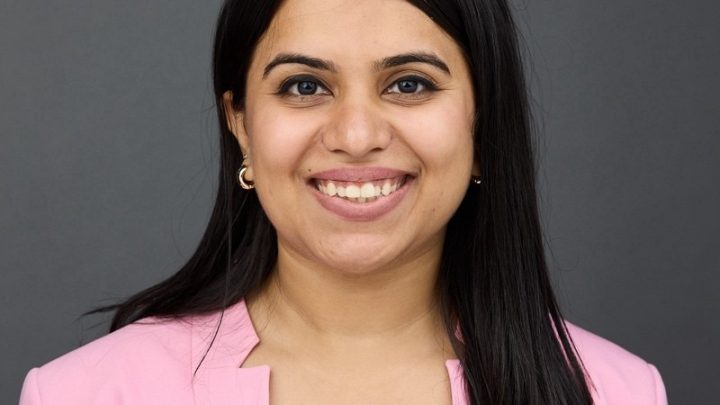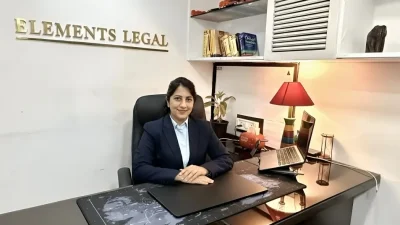Associates, In-House Counsels and Advocates
6698
0
0
“With rapid advancements in technology, particularly with the rise of AI, IP and Data Privacy laws are evolving quickly. Staying updated through IP-specific news, following IP practitioners, and engaging with industry peers will be highly beneficial.” – Isha Gandhi, Senior Legal Associate at R K Dewan & Co.
This interview was taken by SuperLawyer Team
Posted on March 19, 2025
This interview has been published by Anshi Mudgal and The SuperLawyer Team

What initially inspired you to pursue a career in law? What aspects of law sparked your interest and shaped your understanding?
I chose law as a profession because I’ve always had a passion for writing and speaking. Law provides the perfect platform to combine these interests, allowing me to express ideas clearly through legal writing and to advocate effectively in speaking engagements. The ability to analyse complex issues, craft persuasive arguments, and communicate them both in writing and orally is what truly drew me to this field.
After completing your law degree, what experiences influenced your decision to specialize in intellectual property law? What were some of the key moments that helped establish your foundation in IP law?
I developed a strong interest in Intellectual Property Law during my college years, which led me to pursue a specialized diploma in IPR laws from Symbiosis Law School, followed by a course from the World Intellectual Property Organization. The complexity and significance of protecting innovations in an increasingly digital world fascinated me. To deepen my understanding, I also interned with boutique IP firms during my college years, gaining valuable insights into IPR laws.
When advising multinational corporations on IP protection strategies, how do you navigate the complexities of differing national IP laws and enforcement mechanisms? Can you share an example of a time when you successfully managed cross-border trademark infringement issues?
Intellectual Property (IP) laws in most countries are largely governed by international conventions and treaties, such as the TRIPS Agreement (Trade-Related Aspects of Intellectual Property Rights), Berne Convention, etc. which establishes a common framework for IP protection. As a result, the fundamental principles of IP law are generally consistent across jurisdictions. However, each country may have its own specific regulations, enforcement mechanisms, and nuances in how IP rights are granted, protected, and enforced. Thus, navigating the complexities of different national IP laws requires a tailored approach.
A key aspect of advising multinational corporations is understanding the unique regulatory environment in each region and developing a strategy that ensures protection while considering local enforcement challenges. One instance I recall involved a cross-border copyright infringement and trademark passing off issue where the infringer had obtained registration of a concerned trademark in India and the client’s mark was pending for registration. The Trademark laws are territorial in nature and there are multiple cases supporting this principle. In this case we had to establish the malafide adoption by the infringer before the Court and filed multiple rectifications against the fraudulent registrations obtained by the infringer in India. This collaborative approach helped to secure an injunction order in favour of our client.
With the rise of digital platforms, how has IP infringement evolved over recent years, and what proactive measures can brands take to protect their intellectual property online? Drawing from your experience on the Internet Committee at INTA, which policies do you think are essential in addressing online IP issues, particularly with respect to domain name disputes and cybersquatting?
The evolution of IP infringement in the digital space has been significant, with an increase in online piracy, unauthorized use of trademarks, and domain name disputes. Brands must adopt a proactive, multi-faceted approach to protect their IP online, including monitoring digital platforms, utilizing digital tools for brand protection, and engaging in vigilant enforcement actions. On the Internet Committee at INTA, we focus on creating policies that balance the needs of IP owners with the realities of the digital space. Policies to address cybersquatting, such as enhancing domain name dispute resolution mechanisms, are critical. Strengthening the cooperation between domain registrars, social media platforms, and IP owners is vital to combatting these challenges effectively.
As privacy and data protection laws become increasingly significant, how do you incorporate cyber law considerations into your intellectual property advisory, especially when drafting documents such as terms of service, privacy policies, and user agreements?
With privacy and data protection laws becoming increasingly stringent, especially with regulations like GDPR, it’s essential to integrate these considerations into IP advisory work. When drafting documents such as terms of service or privacy policies, I ensure they reflect both IP protection and compliance with data protection laws. This includes ensuring clear consent protocols for data usage, addressing how user data interacts with proprietary technology, and defining the ownership of data generated by users. The intersection of IP and cyber law is particularly important for tech companies or those with a heavy online presence, as they must navigate these dual concerns with care.
How do you approach the drafting and strategy behind a commercial suit for trademark infringement or passing off, as well as copyright infringement, considering the complexities of such cases? Can you share an example of a particularly complex matter that required you to appear before the Delhi District Courts or High Court?
Every case is unique, and before strategizing and drafting a commercial suit, I ensure a thorough investigation of the facts to build a strong case. This includes gathering evidence of use, assessing market presence, and evaluating the likelihood of confusion. Following this, I research the latest legal positions taken by various courts within the country, and in some instances, I also examine international legal perspectives. This ensures that my approach is both methodical and comprehensive.
One particularly complex matter I worked on involved a copyright infringement case against a well-known global online audio-video streaming platform. The case required a deep dive into copyright infringement on the web and the liability of intermediaries. The research expanded to cover the copyright laws of different countries signatory to the Berne Convention, as well as relevant court decisions from multiple jurisdictions.
For law students or aspiring lawyers interested in brand protection, what advice would you give them for building a successful career in IP law? Are there specific resources, strategies, or steps they should take while still in law school or right after graduation to get ahead, particularly in the evolving landscape of legal practice and emerging legal fields?
For law students or aspiring lawyers interested in IP law, I recommend pursuing a specialized course in IP, in addition to thoroughly studying the relevant subjects offered by your college. With rapid advancements in technology, particularly with the rise of AI, IP and Data Privacy laws are evolving quickly. Staying updated through IP-specific news, following IP practitioners, and engaging with industry developments will be highly beneficial. Internships with IP law firms or in-house legal teams, as well as participating in IP-focused Moot Courts and competitions, provide invaluable hands-on experience. Building a solid foundation in both legal theory and practical application is essential as the IP landscape continues to evolve.
Given the high demands of your profession, how do you manage to maintain a balance between your personal and professional life? What practices do you follow to prioritize your health and well-being while maintaining a successful career in law?
Achieving the perfect work-life balance is often seen as a utopian ideal that many of us strive for. While there are times when one must prioritize work or personal life, balancing the demands of a legal career with personal life is undeniably challenging. This field is demanding and keeps you constantly on your toes, so it’s essential to make time for regular exercise and prioritize health and well-being.
Over the years, I’ve learned that delegation is a key part of professional growth, and I make sure to delegate tasks when possible to manage my workload effectively. Having a strong support system—both professionally and personally—also plays a significant role in maintaining this balance.
In addition to my passion for work, I make time for sports and dance to recharge myself. I’m a Kathak trainee and completed my third-year graduation in the art last year. In 2023, I was the runner-up in both the Singles and Mixed Doubles categories at the Delhi High Court Table Tennis Tournaments. I also practice mindfulness and make it a point to disconnect from work and travel when needed to maintain mental well-being.
Having been with R. K. Dewan & Co. for nearly a decade, how has your role evolved over the years, and what factors have contributed to your continued growth within the firm? What do you believe has been key to maintaining your passion and motivation while managing such a dynamic and demanding career in intellectual property law?
Under the mentorship of legal stalwarts Dr. Mohan Dewan, Dr. Niti Dewan, and Mr. N. K. Bhardwaj, my nearly decade-long journey with R. K. Dewan & Co. has shaped me both professionally and personally. Starting as a first-generation lawyer, I have grown to independently advise clients and manage junior lawyers, a progression made possible by the trust the firm has placed in me, which has led to an expansion of my roles and responsibilities over the years. What continues to drive my passion and motivation is the dynamic nature of IP law and the constant challenge of navigating new and complex legal issues.
Maintaining passion and motivation in such a demanding career comes down to balancing professional challenges with personal interests. I find excitement in solving complex problems for clients, and I stay driven by the impact that intellectual property has on innovation and creativity. Additionally, the opportunity to work on diverse and high-profile cases, along with the trust and responsibility the firm has given me, continues to inspire me. The combination of professional growth, personal development, and a supportive work environment has been key to maintaining my enthusiasm for IP law.
Get in touch with Isha Gandhi –







No comments yet
Be the first to share your thoughts about this interview.